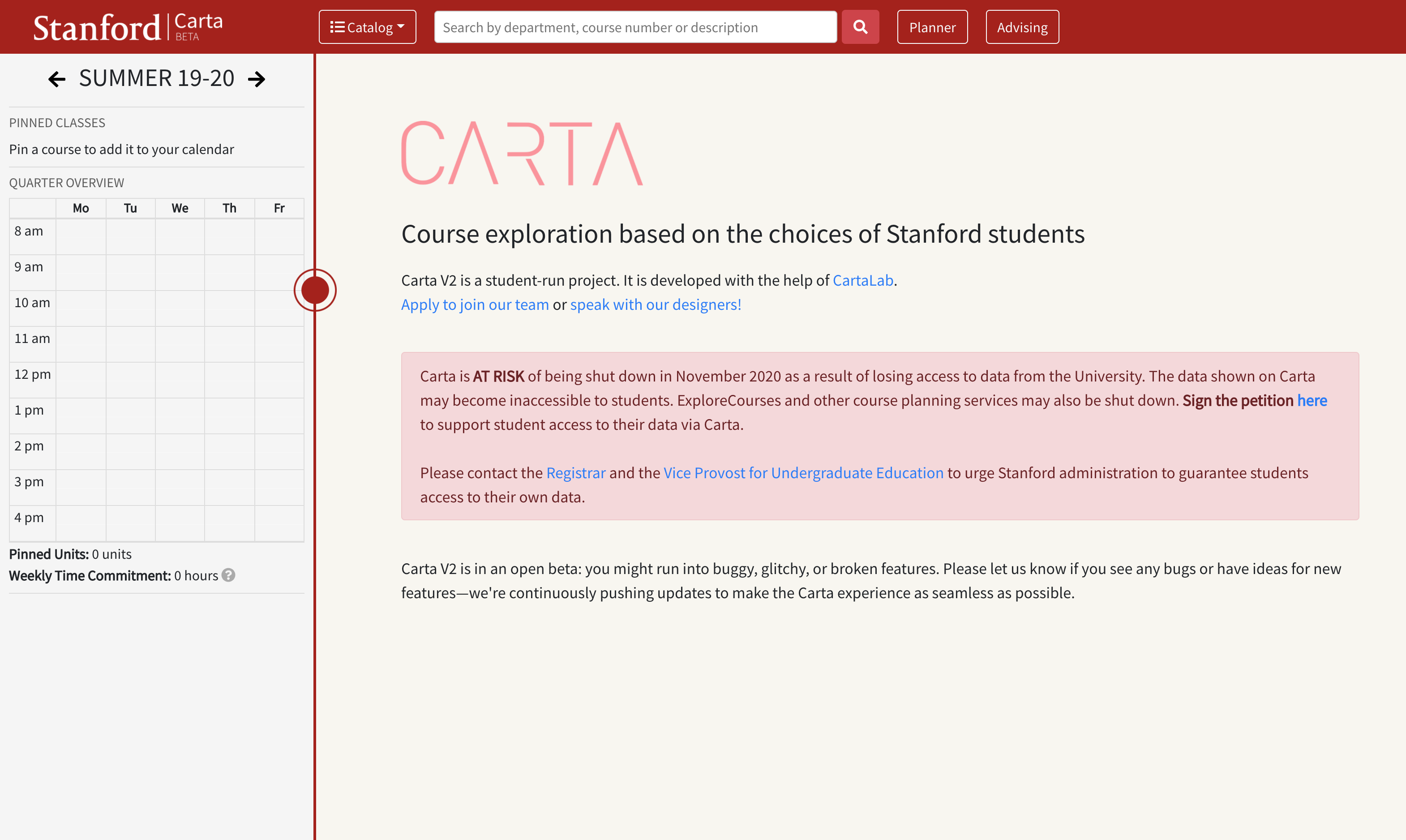Stanford pledged support for the continuation of the Carta project as a student-run organization earlier this month, as a student petition backing the courses-data site garnered hundreds of signatures.
“Carta v1 will be maintained as a service for students until Carta v2 is ready to be launched,” wrote Associate Vice Provost for Student and Academic Services and University Registrar Johanna Metzgar, Vice Provost for Undergraduate Education Sarah Church, computer science professor John Mitchell and education professor Mitchell Stevens in a joint statement to The Daily.
Previously, students on the Carta team claimed they were “at risk of being shut down” due to data Carta relies on possibly becoming inaccessible.
“I don’t think without the petition we would have gotten such a strong response from the registrar’s office… now we have bi-weekly meetings with them,” said Tassica Lim ’21, the new student lead of the Carta project.
Going forward, the team will work with a member of the registrar’s office to ensure Carta’s continuity.
“Church and the University Registrar Johanna Metzgar will work in an advisory capacity with the Carta v2 team as they craft and submit these data requests,” Metzgar, Church, Mitchell and Stevens wrote.
Former Carta v2 project lead Akshay Srivatsan ’21 resigned from his position on Sept. 19 as a result of challenges with the development and release of the updated version of Carta, he wrote in an email announcing his resignation.
The project was originally supposed to launch in early 2021 but the team was rushed to release it prior to the start of the fall quarter, he said.
“In May, I was told that we would have to launch at the end of summer,” Srivatsan wrote. “I was given no input into this process, nor was I even told who to contact to discuss it; it was made by someone above me and passed down until it reached me. Anyone who has worked with software will know how massively infeasible it is to rush deadlines like that.”
Halfway through the summer, the University announced that Carta would lose access to its current data feed and that Srivatsan would need to make a formal data request for information that the platform relied on to operate.
“I was told to expect to lose access to most of our data, since ‘student teams’ (which we were now, through no fault of our own) weren’t allowed the same level of access as research teams,” he wrote.
Following the petition from students, the University recognized a need to be more transparent in the transition process, Metzgar and Church wrote in an open letter to the Stanford community.
“We realize, based on the petition from students, that the process by which Carta V1 and ExploreCourses will be replaced is not sufficiently transparent, and for that we apologize,” they wrote. “We especially regret that students from the Carta v2 team were not present during discussions with the CartaLab team.”
Carta was originally structured as a platform project run out of the Graduate School of Education as CartaLab. Launched in the summer of 2016, the group created a site for students to see data from the University registrar to inform their decision making about courses.
Going forward, Carta will be structured as a student team, potentially through the ASSU, which will allow the group to be more flexible with developments because there won’t be the same level of clearance necessary to make changes, design lead Kristina Inouye ’20 M.S. ’21 said.
“Prior to us becoming independent, we would have had to make sure that any changes weren’t impacting the research in any way. You might see Carta developing in different directions because of that,” she said.
For students, access to information about classes from Carta will remain largely the same, according to Inouye.
“The actual limitations of being a student team versus a research lab aren’t going to be that significant. In terms of what that means for students, there shouldn’t be too much of a difference,” she said. “CartaLab, obviously, is extremely responsible with data, and us, working with the registrar, will also be extremely responsible with data, so it’s not going to be a big difference on that end of things.”
Students said they feel that the platform is integral to their success with choosing courses and making long-term plans.
Rodrigo Nieto ’23, who signed the petition, said he supports Carta’s ongoing access to data.
“I understand how faculty can be concerned about how influential reviews and grade distribution statistics can be on their classes, but, then again, it’s our data as students,” he wrote in a statement to The Daily.
Caroline Van ’24 said Carta helped her balance her course load and prevent burnout.
“Outside of knowing the intensity of classes, I found the reviews extremely useful in deciding when to take the classes I wanted to take so that I had professors who could best help me learn,” she said. “The tips past students provided in those reviews also gave me an idea of what I needed to do to succeed in the classes I chose.”
Other students told The Daily that they believe the features that allow students to see the average number of hours of work a class requires per week, grade distributions and course reviews were important to them.
Lim wrote that the team is currently focused on transitioning Carta v2 to new APIs (pathways to access data stored by software) after the University’s registrar creates them. The team will then shift focus to Carta v3 which will include v2’s speed improvements in addition to new features in the schedule planner and a more intuitive design, she said.
When asked if she was satisfied with the University’s response, Lim said “I’m cautiously optimistic because they have been more cooperative in the past couple weeks.”
This article has been updated to clarify that Mitchell Stevens is an education professor.
Contact Hannah Freeman at freemanh ‘at’ stanford.edu and Sam Catania at samcat ‘at’ stanford.edu.
